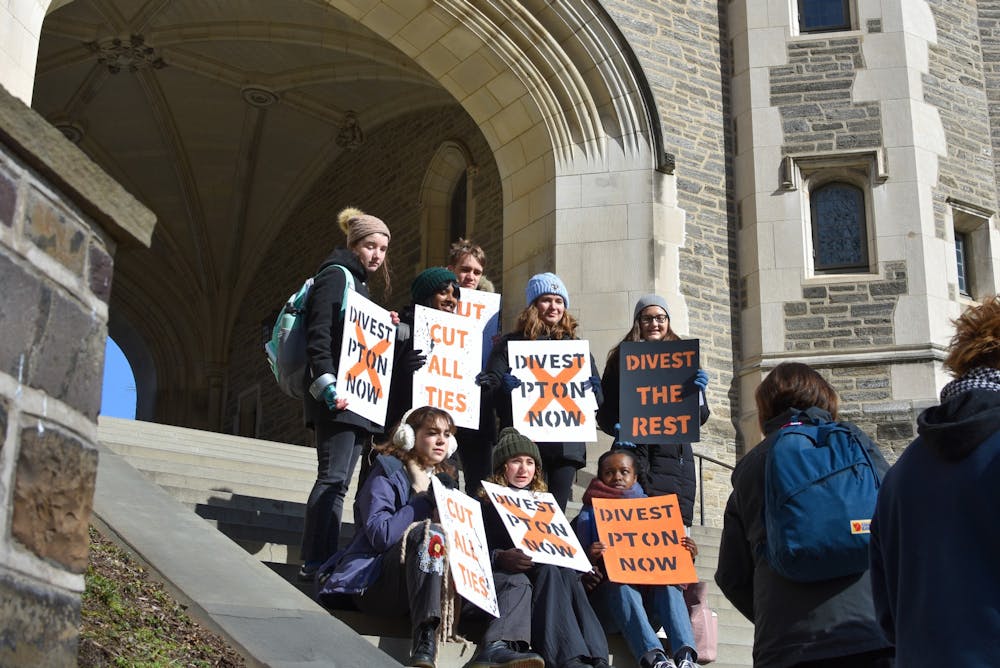A large orange banner hung from the windows of Blair Arch, with the words “Divest in the Service of Humanity.”
Below, around a dozen students gathered, some holding signs with slogans including “Divest the Rest,” “Cut all Ties,” and “Divest Princeton Now.”
Four months after the University announced that it would dissociate from 90 public fossil fuel companies, a few members of Divest Princeton held a demonstration in front of Blair Arch on Feb. 3. The students called on the University to divest the rest of its portfolio from fossil fuels and cut all research ties with fossil fuel companies.
The temperature ranged between 19 and 26 degrees Fahrenheit, a rare patch of frigid cold amid an unseasonably warm winter.
The attendee count was much smaller than at some of the larger Divest protests, with over 100 people coming to the Earth Day No Delay rally in April 2021.
Attendees characterized this demonstration as part of a new campaign.
“Our two major goals for this push of the campaign are: divestment fully. No investment in fossil fuels from the Princeton endowment and then second, all research funding with the fossil fuel companies should be cut,” said Eleanor Clemans-Cope ’26, one of the coordinators of the event.
Clemans-Cope is an associate Opinion editor for The Daily Princetonian.
The University disassociated from fossil fuel companies that are active in thermal coal or tar sands, which the University characterizes as “among the sector’s largest contributors to carbon emissions.” The University also divested, from all publicly-traded fossil fuel companies, a move that does not include cutting research ties. The University left the door open to further dissociation from companies responsible for the spread of climate disinformation, though they noted that the bar for this standard is “exceedingly high … in light of the University’s commitment to embracing the vigorous exchange of ideas.”
According to Divest Princeton’s web page, $700 million are “still invested in private fossil fuel companies.”
The University characterized its dissociation as “focused on the most-polluting segments of the industry and on concerns about corporate disinformation campaigns.”
Makenzie Hymes ’26, one of the protestors, said in a statement to the ‘Prince,’ “the recent divestment announced a couple months ago or at the beginning of the school year was a great first step.”

She continued, “however, Princeton has not fully divested and we want to continue working and continue organizing until this has happened because this is the ultimate goal.”
The protestors specifically focused on the University’s research ties to fossil fuel companies.
Clemans-Cope said that Divest Princeton is pushing to “reach full divestment and also complete dissociation on research terms in order to restore the informational capacity of our research.”
While other universities — including Harvard, Dartmouth, Columbia, and Brown — have divested their endowments from all fossil fuel companies, Princeton is the only Ivy League institution to include cutting research ties in addition to investment as part of their definition of dissociation.
However, Raphi Gold ’26, a member of Divest Princeton who helped to plan the event, told the ‘Prince’ that the University must go further.
“Much of Princeton’s research, for example, the Netzero America project is funded by fossil fuel companies, like BP and Exxon,” she said.
Gold is a Features staff writer for the ‘Prince.’
The University, when dissociating from the 90 fossil fuel companies, used a reworked definition of dissociation which includes “no longer soliciting or accepting gifts or grants from a company, purchasing the company’s products, or forming partnerships with the company that depend upon the exchange of money.” This precludes any research funding from companies on the list. The ExxonMobil Corporation is one of the companies dissociated from, meaning that research grants should no longer be expected, including to the NetZero America project. British Petroleum did not meet the criteria for dissociation.
Alex Norbrook ’26, another coordinator of the demonstration, spoke about the University’s financial sources of climate change research.
“[The University] also accept[s] fossil fuel money to fund climate research, which we think is a conflict of interest and something that needs to be stopped, basically as soon as possible,“ he said.
Norbrook noted that funding climate research “isn’t wrong itself,” but noted the potential for biased results. Norbrook alleged that funders may have influence over research content and questions.
The University’s Research Integrity & Assurance page states, “The University does not accept research sponsorship predicated on the finding of predetermined research results.“
Clemans-Cope emphasized the University's responsibility towards climate protection.
“Princeton is the number one university in the country,” she said, “and we have a major responsibility to act responsibly and protect the climate for future generations and change our current behavior.”

Divest Princeton protestors pose below banner
Courtesy of Aishwarya Swamidurai ’26
Janny Eng is a News contributor for the ‘Prince.’
Please send any corrections to corrections[at]dailyprincetonian.com.
Correction: This piece has been updated to clarify that Princeton has divested from all publicly traded fossil fuel companies.








